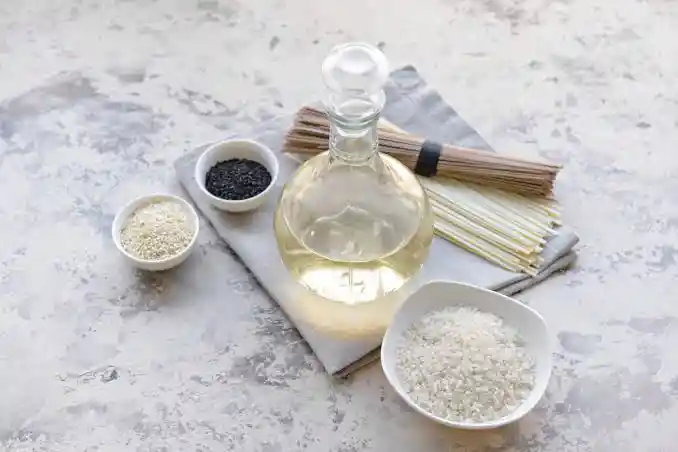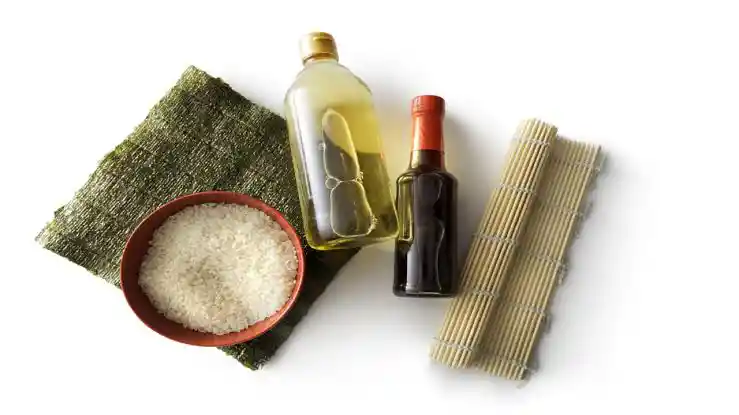Is Rice Wine Vinegar Halal? Quick Facts
Is rice wine vinegar halal? Rice wine vinegar is a popular ingredient in Asian cuisine and is used in a variety of dishes such as sushi, salads, and marinades.
Advertisements
But for those who follow a halal diet, it’s important to know if the vinegar is permissible to consume.
In this blog post, we will explore the production methods of rice wine vinegar to determine if it is halal and suitable for consumption by those who follow Islamic dietary laws.
Is Rice Wine Vinegar Halal?
Yes, rice wine vinegar is considered halal when the wine turns to vinegar by itself, without any deliberate treatment needed for it to be changed, it is permissible to eat, drink and handle, according to the consensus of the scholars.
This is because Jabir (may Allah be pleased with him) reported that the Prophet (peace and blessings of Allah be upon him) said: “What a good food vinegar is.”
Advertisements
But if the wine has become vinegar because of deliberate treatment, by adding vinegar, onions, salt etc., or by any other process, in this case the scholars (may Allah have mercy on them) differ as to whether it is permissible.
The vinegar, which comes from wine, has one of two cases. In the first case, the transformation process of wine into vinegar happens by itself without any effort to manufacture it. This vinegar is absolutely halal and permissible 100%.
However, if the wine has been transformed by the actions of someone else, by adding something to it to make it vinegar, whether it contains remains of alcohol or not, this vinegar is not halal for you.

The Shafi’is, Hanbalis and some of the Malikis say that it is not permissible to deliberately change wine to vinegar because then it is not pure.
The evidence for this is the hadith of Anas ibn Malik (may Allah be pleased with him) who said:
Advertisements
“The Messenger of Allah (peace and blessings of Allah be upon him) was asked whether wine could be changed to be used as vinegar. He said, ‘No.’” Reported by Muslim
Abu Talhah (may Allah be pleased with him) reported that the Prophet (peace and blessings of Allah be upon him) was asked about some orphans who had inherited some wine.
He said, “Pour it away.” He was asked, “Could they not make it into vinegar?” He said, “No.” (Reported by Muslim).
Advertisements
Therefore, we have to verify how the process of the transformation from wine to vinegar took place.
The process of making rice wine vinegar, according to Healthline involves fermenting the starches in rice using an acetic acid bacteria known as Mother of Vinegar (Mycoderma aceti) and small amounts of rice wine to convert the sugars into alcohol and then into acetic acid.
The key factor in determining the halal status of rice wine vinegar is how wine vinegar is produced.
If the wine turns into vinegar by itself (without any deliberate interference from humans), it is halal.
However, some others believe that wine vinegar is halal, either when it turns naturally or by an intentional process.
As you can see, according to Shafi’i, rice wine vinegar is only halal when the wine spontaneously turns into vinegar, without any human helps. Meanwhile, the Hanafi school rules that wine vinegar is halal, either way.
In general, Muslim scholars agree unanimously that when wine turns into vinegar by itself (without any deliberate interference from humans), it is halal.
However, some others believe that wine vinegar is halal, either when it turns naturally or by an intentional process.
Sheikh Yusuf Al-Qaradawi, on this issue stated:
“Muslim scholars unanimously agree that if wine turns into vinegar by itself, it is lawful.
However, if it turns into vinegar with the aid of a chemical substance or by adding something, such as salt, bread or onion, to it, scholars hold different views regarding it.
Although some scholars say that it is pure and lawful because it has been changed from its original state, others say that it is still impure and, thus, it is must be avoided.
In his book, Al-Majmu, Imam An-Nawawi stated:
‘If wine changes into vinegar by itself, it becomes pure according to the majority of scholars. However, if the change is a result of putting something in it, I say that it is still impure. Ahmad and most scholars also hold this view. Abu Hanifah, Al-Awzai and Al-Layth consider it pure.’
Read reconciling between the prohibition on turning wine into vinegar from an authorized Islamic site.
You can also watch the Fatwa on whether wine vinegar is considered halal or haram from Sheikh Assim Al Hakeem.
- You may also like: Is Extra Gum Halal?
Advertisements








3 Comments